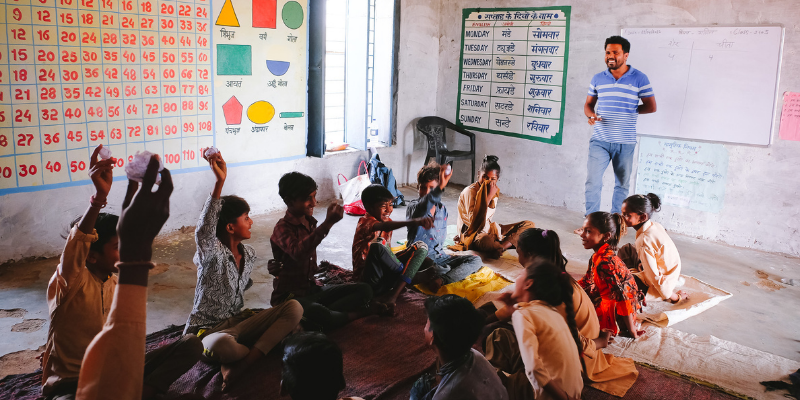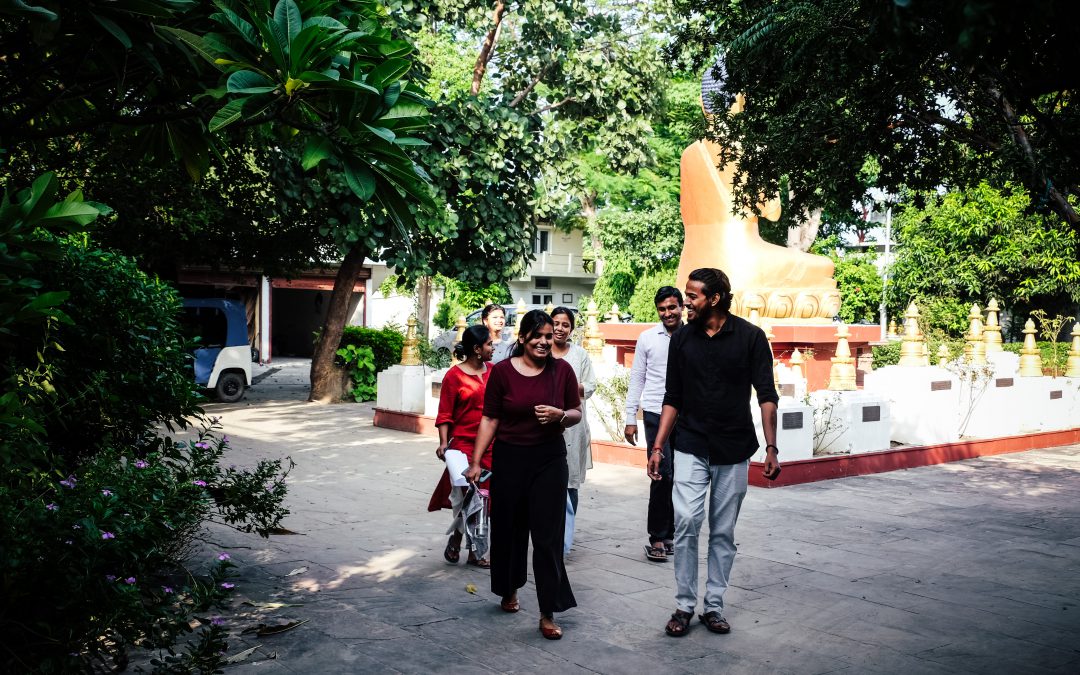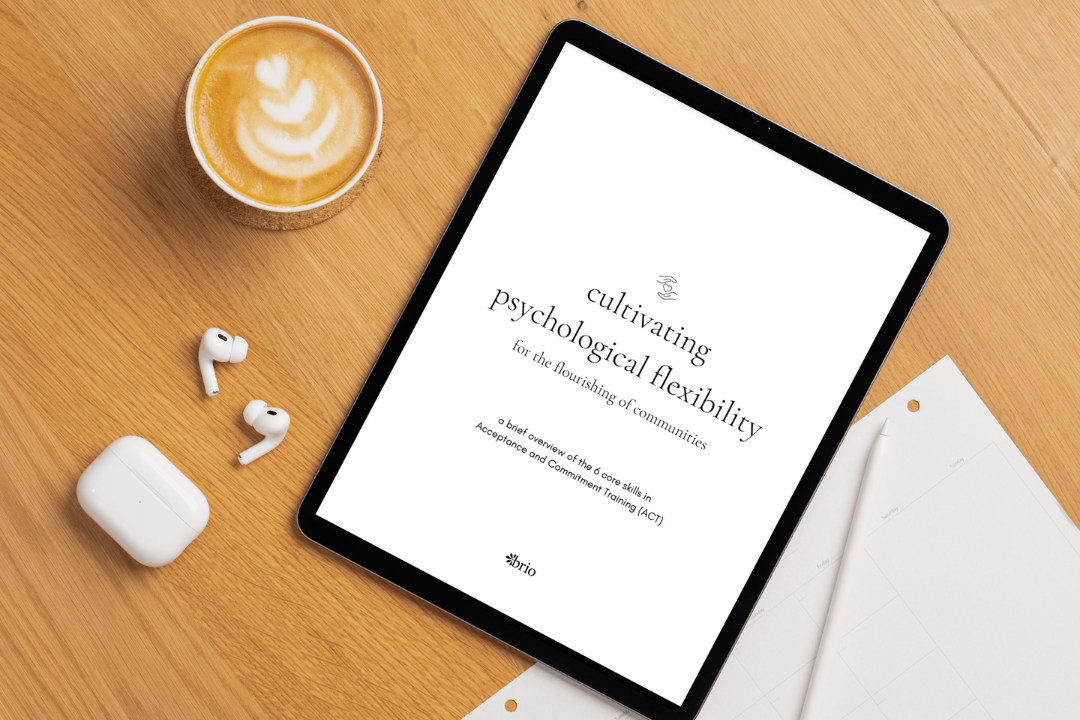Our evidence-based approach
Discover the psychological framework at the heart of our programs: Acceptance & Commitment Training (ACT).
Our evidence-based approach
Discover the psychological framework at the heart of our programs: Acceptance & Commitment Training (ACT).
ACT is one of the most research-backed mental health approaches out there, with over 1,000 randomized controlled trials supporting its ability to build psychological flexibility. The approach helps alleviate mental illness, prevent its onset, and promote positive mental health.
ACT is one of the most research-backed mental health approaches out there, with over 1,000 randomized controlled trials supporting its ability to build psychological flexibility. The approach helps alleviate mental illness, prevent its onset, and promote positive mental health.
The power of ACT
Supporting studies across a wide range of populations
%
Randomized-controlled trials were completed within the last decade
Meta-analyses demonstrating ACT is efficacious
Supporting studies across a wide range of populations
%
Randomized-controlled trials were completed within the last decade
Meta-analyses demonstrating ACT is efficacious
The main goal of ACT: psychological flexibility
Psychological flexibility consists of 6 key mental skills—mindfulness and action skills—that help us stay engaged in building a rich, meaningful and purposeful life even in the midst of ongoing challenges.
Mindfulness Skills
The mindfulness skills are about fully entering the present moment as the only place and time where choice and action are possible.
Be Present
Being present means making full contact with the present moment, including all aspects of your body, thoughts, and emotions. By learning to keep our attention focused in the present, worry, anxiety, negative thoughts, and dire predictions hold less power. We discover that there is more choice, more freedom, and more flexibility in the present moment than the past or future can ever offer us.
Acceptance
Acceptance means making space for the wholeness of our experience—even the unpleasant parts. It means learning how to acknowledge our experience as a normal part of what it means to be human. When we learn how to open up to our full experience, it frees us up to drop the struggle with ourselves and to start turning our energies to the things that matter most to us.
Defusion
When we are experiencing difficult emotions, our thoughts are often also a significant piece of the suffering. Oftentimes, they get so frequent and so strong that it is as if they sink their hooks into us and simply won’t let go. One way we can practice disentangling ourselves is to bring the same observation and curiosity to our thoughts that we bring to other parts of our experience. This can give us a little space to step back rather than getting caught up in our thoughts and feelings.
Self-as-Context
We all hold self-stories: labels, descriptions, and even factual statements about ourselves that help us to make sense of who we are. Sometimes, they can be invaluable. Other times, we may cling so tightly to one piece of identity content that it costs us something important. But what if we learned how to distance our sense of self from the content or our self-stories, as if we are observing all those ideas swimming around inside of us? This is what Self-as-Context is all about.
Action Skills
The action skills are key to making the choices and taking the action that leads to a meaningful life. But action alone is not enough without being guided by clear values—knowing what really matters in life.
Values
Values are more than goals and temporary feelings. They describe the essence of our way of being in the world: our chosen qualities; what is truly important to us about being a friend, a family member, a partner, a co-worker, or simply a human being. Articulating our values clearly, even if our goals take longer to reach or the feelings aren’t always easy, allows us to stay committed to becoming the very best version of ourselves that we can be.
Committed Action
Despite the popular idea of using incentives and punishments, the most effective way to create long-term change is to root our efforts in our core values. This is why this skill is called “Committed Action”— making a commitment to living in alignment with our core values. When we root our actions in our values, they provide guidance for our direction and ideas about what concrete steps we can take, so that we can continue to commit ourselves to what is truly important.
The main goal of ACT: psychological flexibility
Psychological flexibility consists of 6 key mental skills—mindfulness and action skills—that help us stay engaged in building a rich, meaningful and purposeful life even in the midst of ongoing challenges.
Mindfulness Skills
The mindfulness skills are about fully entering the present moment as the only place and time where choice and action are possible.
Be present
Being present means making full contact with the present moment, including all aspects of your body, thoughts, and emotions. By learning to keep our attention focused in the present, worry, anxiety, negative thoughts, and dire predictions hold less power. We discover that there is more choice, more freedom, and more flexibility in the present moment than the past or future can ever offer us.
Acceptance
Acceptance means making space for the wholeness of our experience—even the unpleasant parts. It means learning how to acknowledge our experience as a normal part of what it means to be human. When we learn how to open up to our full experience, it frees us up to drop the struggle with ourselves and to start turning our energies to the things that matter most to us.
Defusion
When we are experiencing difficult emotions, our thoughts are often also a significant piece of the suffering. Oftentimes, they get so frequent and so strong that it is as if they sink their hooks into us and simply won’t let go. One way we can practice disentangling ourselves is to bring the same observation and curiosity to our thoughts that we bring to other parts of our experience. This can give us a little space to step back rather than getting caught up in our thoughts and feelings.
Self-as-Context
We all hold self-stories: labels, descriptions, and even factual statements about ourselves that help us to make sense of who we are. Sometimes, they can be invaluable. Other times, we may cling so tightly to one piece of identity content that it costs us something important. But what if we learned how to distance our sense of self from the content or our self-stories, as if we are observing all those ideas swimming around inside of us? This is what Self-as-Context is all about.
Action Skills
The action skills are key to making the choices and taking the action that leads to a meaningful life. But action alone is not enough without being guided by clear values—knowing what really matters in life.
Values
Values are more than goals and temporary feelings. They describe the essence of our way of being in the world: our chosen qualities; what is truly important to us about being a friend, a family member, a partner, a co-worker, or simply a human being. Articulating our values clearly, even if our goals take longer to reach or the feelings aren’t always easy, allows us to stay committed to becoming the very best version of ourselves that we can be.
Committed Action
Despite the popular idea of using incentives and punishments, the most effective way to create long-term change is to root our efforts in our core values. This is why this skill is called “Committed Action”— making a commitment to living in alignment with our core values. When we root our actions in our values, they provide guidance for our direction and ideas about what concrete steps we can take, so that we can continue to commit ourselves to what is truly important.
ACT at the community level
ACT helps not only those with mental health conditions, but everyone to experience greater freedom and agency to live meaningfully.
Plus, it can be cultivated across various contexts using very few resources—no equipment, pharmaceuticals, or years of education required.
That’s why it’s a highly effective way to promote mental health at the community and population level.
What about marginalized contexts?
ACT is a particularly relevant framework for individuals and communities experiencing adversity.
At its core, the method helps us change the way we relate to our pain by turning toward our experiences with openness, even kindness.
This expands our range of choices, allowing us to live out our personal and communal values through concrete action.
ACT at community level
ACT helps not only those with mental health conditions, but everyone to experience greater freedom and agency to live meaningfully.
Plus, it can be cultivated across various contexts using very few resources—no equipment, pharmaceuticals, or years of education required.
That’s why it’s a highly effective way to promote mental health at the community and population level.
What about marginalized contexts?
ACT is a particularly relevant framework for individuals and communities experiencing adversity.
At its core, the method helps us change the way we relate to our pain by turning toward our experiences with openness, even kindness.
This expands our range of choices, allowing us to live out our personal and communal values through concrete action.
How does it work in practice?
With each partner community, we seek to identify what it looks like to live “the good life”—a life of meaning, connection and purpose, even if external circumstances continue to be difficult.
Intro to ACT in 3 steps
We cluster the ACT skills into three easy-to-learn concepts: Be present. Have compassion. Do what matters.
Culturally adapted stories
We co-create culturally adapted stories and metaphors to illustrate the ACT skills in ways that resonate and stay with participants.
Diverse delivery channels
We use delivery channels such as in-person groups, radio, creative activities, virtual check-ins, WhatsApp, and curriculum, tailored to local context needs.
How does it work in practice?
With each partner community, we seek to identify what it looks like to live “the good life”—a life of meaning, connection and purpose, even if external circumstances continue to be difficult.
Intro to ACT in 3 steps
We cluster the ACT skills into three easy-to-learn concepts: Be present. Have compassion. Do what matters.
Culturally adapted stories
We co-create culturally adapted stories and metaphors to illustrate the ACT skills in ways that resonate and stay with participants.
Diverse delivery channels
We use delivery channels such as in-person groups, radio, creative activities, virtual check-ins, WhatsApp, and curriculum, tailored to local context needs.
Psychological flexibility in action
Since 2018, over 133,500 people around the world have experienced the power of ACT through our partnerships. Explore some of the highlights below.
Since 2018, over 133,500 people around the world have experienced the power of ACT through our partnerships. Explore some of the highlights below.
Hausla – wellbeing skills for teachers
Co-created with Kshamtalaya and government-school teachers, Hausla is a wellbeing program for educators in Rajasthan and Bihar. The program currently reaches over 124,000 participants, significantly improving their wellbeing, mindfulness, and resilience, and making classrooms more engaging, compassionate, and nurturing. Learn more about the program.
Co-created with Kshamtalaya and government-school teachers, Hausla is a wellbeing program for educators in Rajasthan and Bihar. The program currently reaches over 124,000 participants, significantly improving their wellbeing, mindfulness, and resilience, and making classrooms more engaging, compassionate, and nurturing. Learn more about the program.
%
improved on the WHO-5 Wellbeing Index
%
improved on the Kentucky Inventory of Mindfulness Skills
%
improved on the Connor-Davidson Resilience Scale
Khushi Shala – children thriving
Co-designed with Kshamtalaya and the Rajasthan education department, Khushi Shala integrates mental health in public schools across Rajasthan. After a successful pilot with 120 teachers and 1300+ children (see results below), we are now scaling state-wide, training teachers and school leaders to support the wellbeing of 3.3 million+ children each year. Learn more about the program.
Co-designed with Kshamtalaya and the Rajasthan education department, Khushi Shala integrates mental health in public schools across Rajasthan. After a successful pilot with 120 teachers and 1300+ children (see results below), we are now scaling state-wide, training teachers and school leaders to support the wellbeing of 3.3 million+ children each year. Learn more about the program.
%
girls improved their wellbeing
%
students improved their wellbeing
%
teachers said they started wellbeing practices in their personal life
%
teachers felt confident to implement the curriculum
%
girls improved their wellbeing
%
students improved their wellbeing
%
teachers said they started wellbeing practices in their personal life
%





